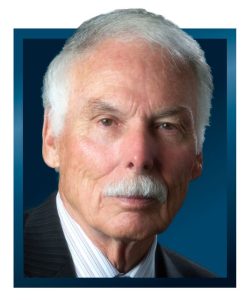Board Member
Liberty Media and Liberty Global

Larry Romrell’s modesty belies his great success. Uncomfortable in the spotlight, he sees himself as lucky — in the right place at the right time with the right people. In fact, he helped build the cable industry.
Growing up in Idaho, Romrell’s earliest ambition was to be a pilot. He studied electronics in college but, “I didn’t finish because there was a local TV station being constructed in Pocatello, Idaho. They hired me and paid me a lot more than the graduates were making.” At Salt Lake City’s KCPX, he gained experience with microwave technology.
Then community antenna system owner Bob Magness offered him a job. Romrell says he’d been “indoctrinated” with broadcasters’ anti-cable viewpoint and was hesitant to work on Magness’s microwave sites in Montana and Wyoming. But “I liked him on the phone, so I went to work [for him] right away and I was able to get things stabilized,” Romrell recalls.
Romrell became Magness’s chief engineer and then manager, traveling with his boss on acquisition trips that changed his view of cable. “I no longer felt I was a turncoat. I could see that the problem in small towns was that they had one broadcast signal or none,” he says.
Magness’s cable company grew, moved to Denver, and became TCI in 1968. Romrell led the company’s microwave subsidiary, Western Telecommunications, which grew along with TCI, eventually stretching from Omaha to San Francisco. The Idaho country boy “waltzed into the offices of TV network executives and made proposals that (our) equipment would be a lot better for them. We fed every broadcaster signals along that route,” he recalls.
Romrell’s work included building the first fiber network inside NORAD in Colorado Springs. A separate contract took him to Saudi Arabia to install the microwave radios for the government across the desert from Riyadh to Jeddah. There, he and his team observed princes on a falconry hunt using a transportable microwave satellite uplink – new technology at the time. “I convinced Bob that we should buy one and use it for remote satellite uplinking,” he recalls. They went on to support uplinking for the NFL, space shuttle launches, and primetime news events. The team also did the satellite uplinking for the Olympics in 1980 and 1984.
In 1978 Western Telecommunications merged with Marcus Communications to become WestMarc, which was spun out as a separate cable company with Romrell and Jeff Marcus at the helm. TCI repurchased WestMarc a few years later and made Romrell a senior vice president.
In 2000, Romrell achieved his childhood dream of becoming a pilot. Today, he enjoys flying and ranching. He currently serves on the boards of Liberty Media, Liberty Global, and Trip Advisor. Looking back on a remarkable career, he says, “I guess if there’s something I did right, it’s that I hired really good people. And I had the best mentors that a person could ever follow, like Bob Magness and John Malone. I didn’t do it on my own.”
